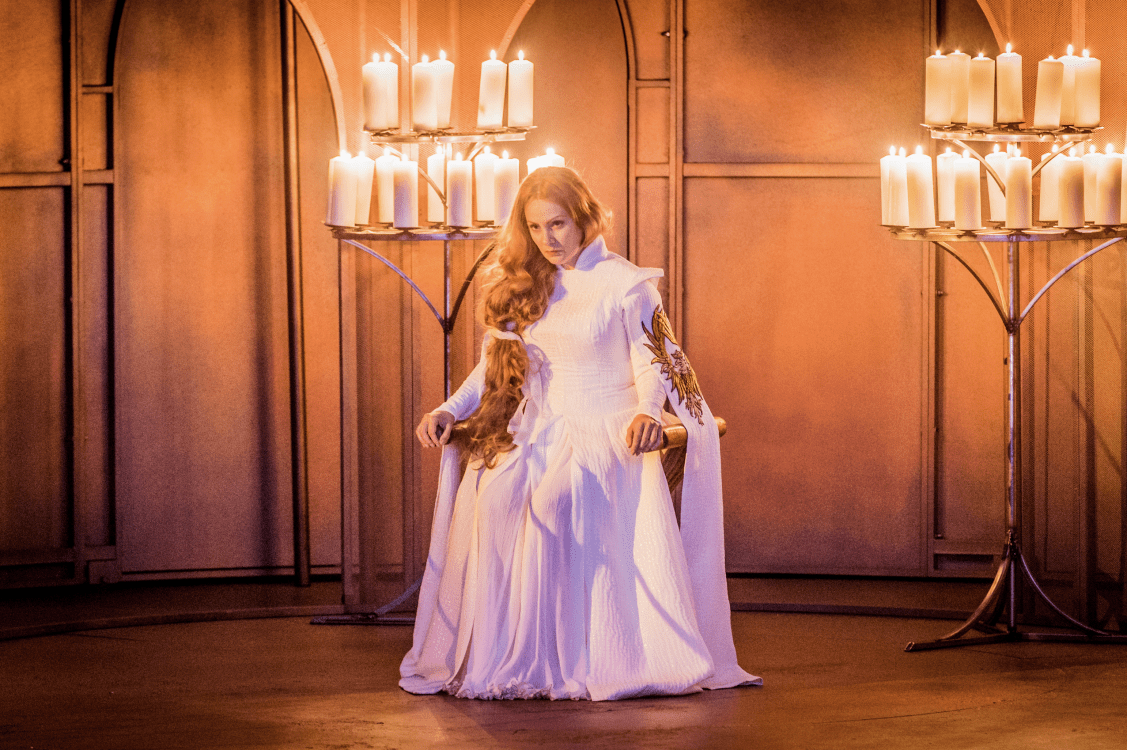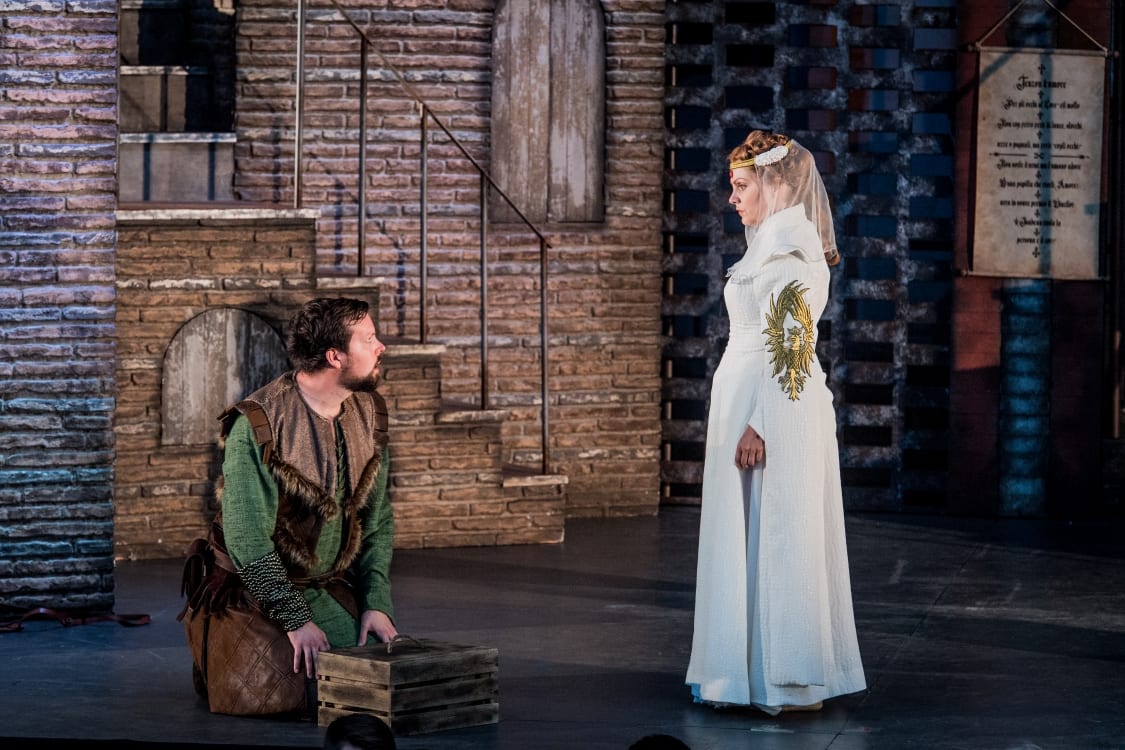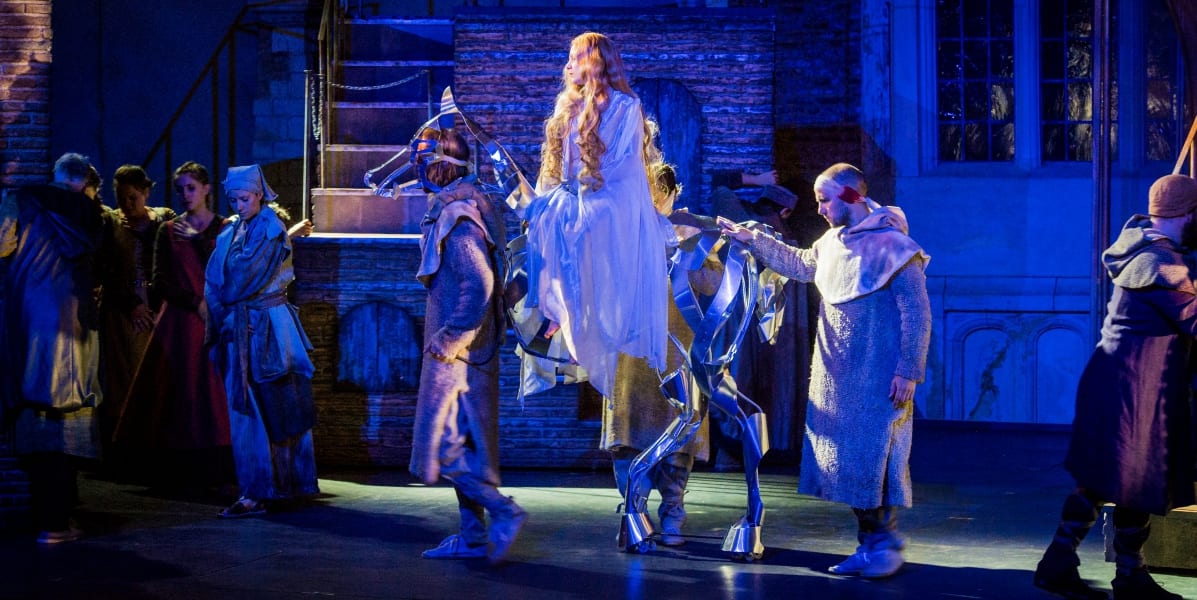Each year Opera Holland Park includes one less well known or even forgotten work from the era of Puccini. This year’s choice, ‘Isabeau’ dates from 1911 and has never before received a performance in the UK. The plot is a variant on the Lady Godiva legend, in which the king’s daughter is punished for refusing all suggested suitors by being paraded naked on a horse through the city. All the citizens bar one take her side and avert their collective gaze. One man alone, the young falconer Folco, looks on her and proclaims her nakedness as gloriously lovely, showering her with flowers as he does so. Imprisoned for his actions, he receives a visit from the princess and she discovers a love for him that she did not find for the other suitors. After a searing love duet, all ends unhappily as the mob and the king’s evil councillor ensure between them that neither survives and convention is upheld.

The piece comes from Mascagni’s middle period, well after the ‘verismo’ success of ‘Cavalleria Rusticana’, and at a time when he was trying to incorporate Wagnerian innovation into the Italian tradition of continuous operatic melody. The debt to Wagner is mainly in the scrunching chromatic harmonies that pile up in the orchestra but it is motivic too, with echoes of ‘Tristan’ in the main love duet, and even a reminiscence of the ‘Curse’ motif when the heroine, Isabeau, is rejected by her father.
Despite the musical sophistication and the fine craft deployed throughout, the work does not make its case for revival. There are insufficient melodies that linger in the memory and in fact it is the orchestral intermezzo describing the humiliation of the princess that could probably best stand alone, just as its parallel movement in ‘Cavalleria’ often does.
That said, it is hard to imagine a better performance of this work by all concerned, whatever one might think of the opera itself. In particular the orchestra and the chorus perform with a fierce, admirable intensity and technical skill under the leadership of Francesco Cilluffo that indicates full commitment to the project. The same can be said of the vocal principals, all of whom have fine instruments at their command, which they use with rare panache. The problem is ultimately one of genre. Brought up as we are on such reflexively satirical vehicles as Monty Python, Spamalot and Blackadder it is very hard for us to take this kind of full-on cod-medieval drama at swashbuckling face value however fine its presentation.
There can be no reservations though about the two leads. Anne Sophe Duprels is a regular and favourite singer at Opera Holland Park; and once again her signature virtues are brought very much to the fore: a tone both radiant and commanding, and very plausible acting skills, whatever the indignities inflicted on her character. She is superbly matched by David Butt Philip, truly a young singer to watch in this repertory. His voice has heroic scale and delicacy coupled with fine acting skill, which deserves better material than the arias that come his way here. His presence is also a tribute to the way in which Opera Holland Park have nurtured talent from chorus to solo stardom.
Among the secondary roles Mikhail Svetlov embodies a lot of frustration and remorse as the ineffectual king subordinated to a conniving courtier Cornelius, sung with sinister venom by George von Bergen. Fiona Kimm finds defiance and poignancy in the structurally important role of Folco’s grandmother, Gilgietta; and other minor roles are well taken, though there is a limit to what you can do with characters named Ethel, Ermyntrude and Ermyngarde.

The designer, Takis, and lighting designer Robbie Butler have come up with a lot of devices to keep the action flowing and to lend plausibility to some fairly unlikely circumstances. The set makes the most of the width of stage at Holland Park, offering a sequence of staircases and building blocks that could be flexibly moved around and opened out, especially during the intermezzo. The production team have also learned lessons from ‘Warhorse’ in using skeletal fragments to good effect in indicating the flight of a falcon and the horse-ride through the city.
One can only applaud Opera Holland Park’s missionary work on behalf of lost repertory and their advocacy on behalf of ‘Isabeau’ is exemplary. Sadly they cannot in every case succeed in overturning the verdict of time.

